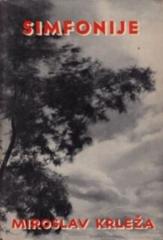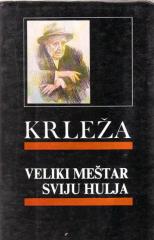Miroslav Krleža
Miroslav Krleža (7. jul 1893 – 29. decembar 1981) bio je jedan od najznačajnijih hrvatskih pisaca 20. veka – pesnik, romanopisac, dramaturg, esejista i enciklopedista. Rođen je u Zagrebu, školovao se na Austrougarskoj vojnoj akademiji, ali se brzo posvetio književnosti i intelektualnoj delatnosti. Bio je snažan kritičar društvene nepravde, sitne buržoazije i političkog oportunizma, što je karakterisalo veliki deo njegove književnosti.
Njegov rad obuhvata širok spektar žanrova. Ističu se romaneskni ciklus o Glembajevima (Glembajevi, U agoniji, Leda) i epski roman Povratak Filipa Latinoviča (1932). Pisao je i eseje, dnevnike, kritike, enciklopedijske članke i pesme poput onih iz zbirke Pan.
Krležin stil karakteriše bogat rečnik, složene rečenice, intelektualna dubina, ironično distanciranje. Bio je ključna ličnost hrvatske kulture i jedan od osnivača Leksikografskog zavoda (danas Leksikografski zavod Miroslav Krleža). Uprkos političkim pritiscima, ostao je veran intelektualnoj autonomiji.
Krležina zaostavština nezaobilazna je u hrvatskom kanonu i nezaobilazna u razumevanju modernosti i istorijske sudbine Hrvatske i srednje Evrope.
Naslovi u ponudi
Simfonije
Minerva je početkom tridesetih počela s objavljivanjem sabranih djela Miroslava Krleže. Planirano je objavljivanje osamnaest knjiga, a nakon policijskih pritisaka, završilo se sa devet objavljenih naslova.

